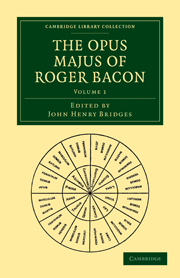PART IV - MATHEMATICAL SCIENCE
Published online by Cambridge University Press: 04 April 2011
Summary
PARS QUARTA
HUJUS PERSUASIONIS
In qua ostenditur potestas mathematicae in scientiis, et rebus, et occupationibus hujus mundi.
DISTINCTIO PRIMA, HABENS CAPITULA TRIA
CAPITULUM I
The key to the greater sciences is mathematic
Manifestato quod multae praeclarae radices sapientiae dependent ex potestate linguarum, per quas est introitus in sapientiam Latinorum, nunc volo revolvere fundamenta ejus dem sapientiae penes scientias magnas, in quibus est specialis potestas respectu caeterarum scientiarum et rerum hujus mundi. Et sunt quatuor scientiae magnae, sine quibus caeterae scientiae sciri non possunt, nec rerum notitia haberi: quibus scitis, potest quilibet gloriose proficere in sapientiae potestate sine difficultate et labore, non solum in scientiis humanis, sed divina. Et cujuslibet istarum tangetur virtus non solum propter sapientiam absolute, sed respectu caeterorum praedictorum. Et harum scientiarum porta et clavis est mathematica, quam sancti a principio mundi invenerunt, ut ostendam, et quae semper fuit in usu omnium sanctorum et sapientum prae omnibus aliis scientiis. Cujus negligentia jam per triginta vel quadraginta annos destruxit totum studium Latinorum. Quoniam qui ignorat eam non potest scire caeteras scientias nec res hujus mundi, ut probabo. Et, quod pejus est, homines eam ignorantes non percipiunt suam ignorantiam, et ideo remedium non quaerunt. Ac per contrarium hujus scientiae notitia praeparat animum et elevat ad omnium certificatam cognitionem, ut si radices sapientiae datas circa illam cognoscat, et eas radices recte applicet ad caeterarum scientiarum et rerum cognitiones, tunc omnia sequentia poterit scire sine errore et sine dubitatione, ac de facili et potenter.
- Type
- Chapter
- Information
- The Opus Majus of Roger Bacon , pp. 97 - 404Publisher: Cambridge University PressPrint publication year: 2010First published in: 1897



